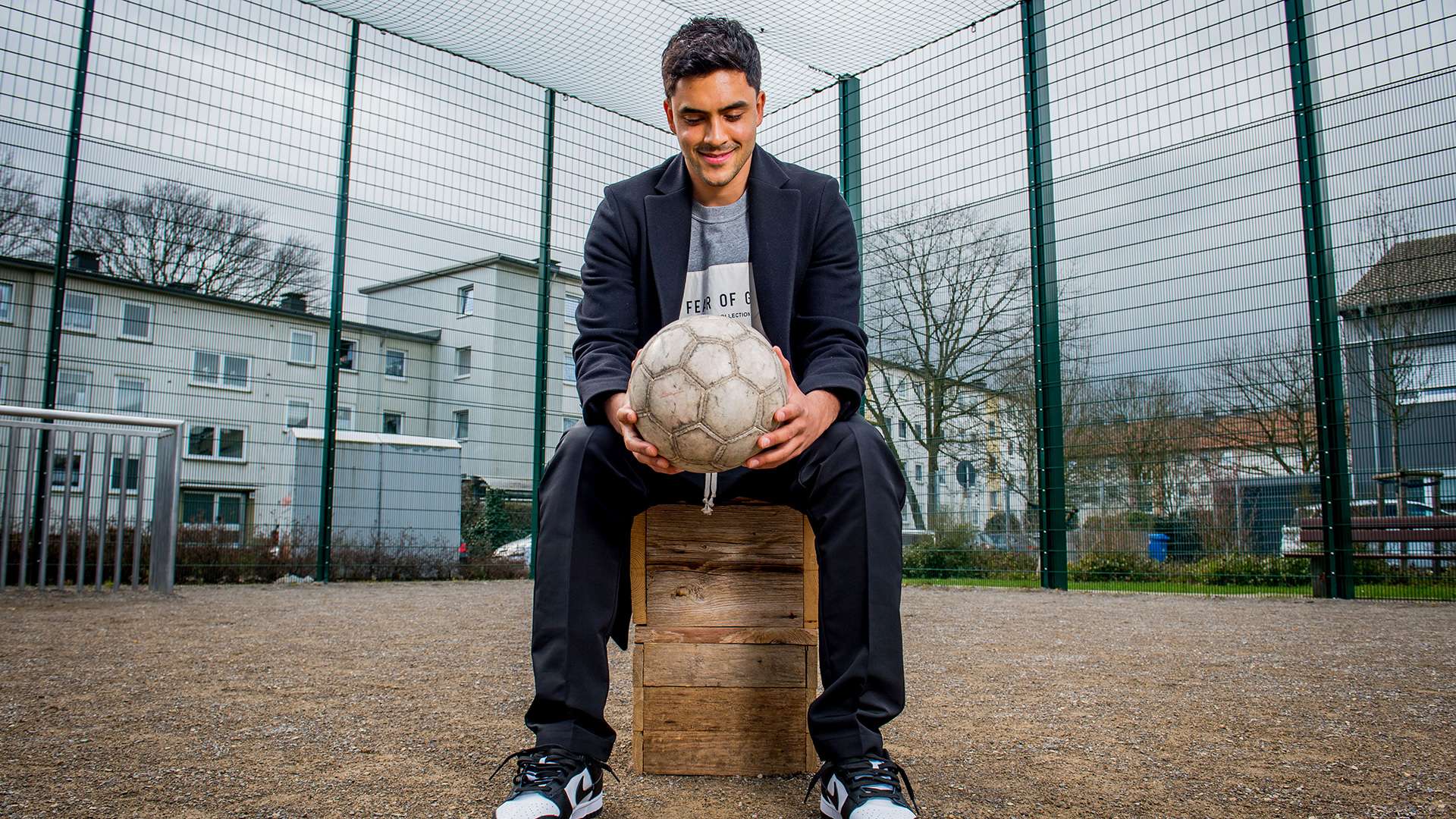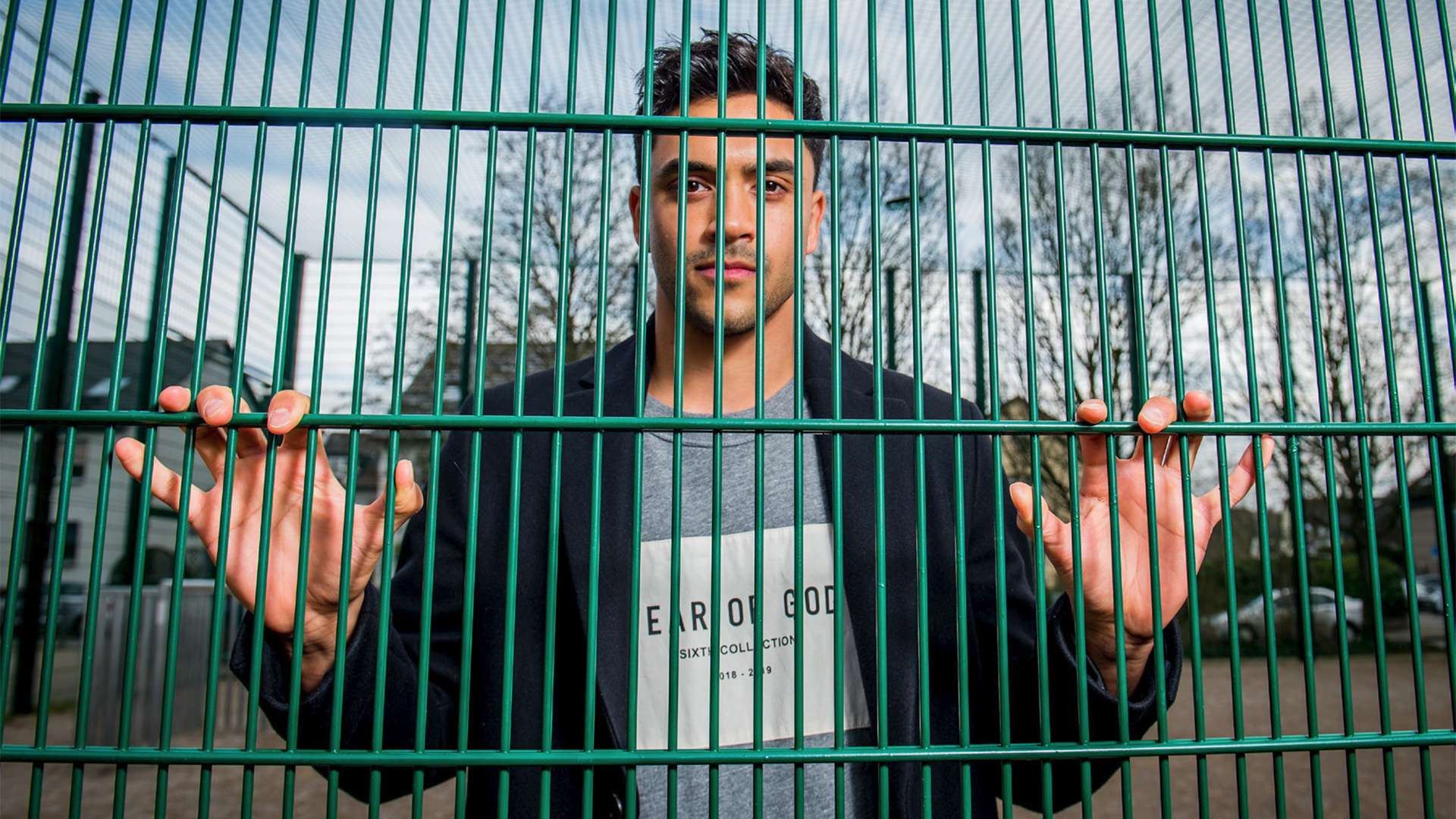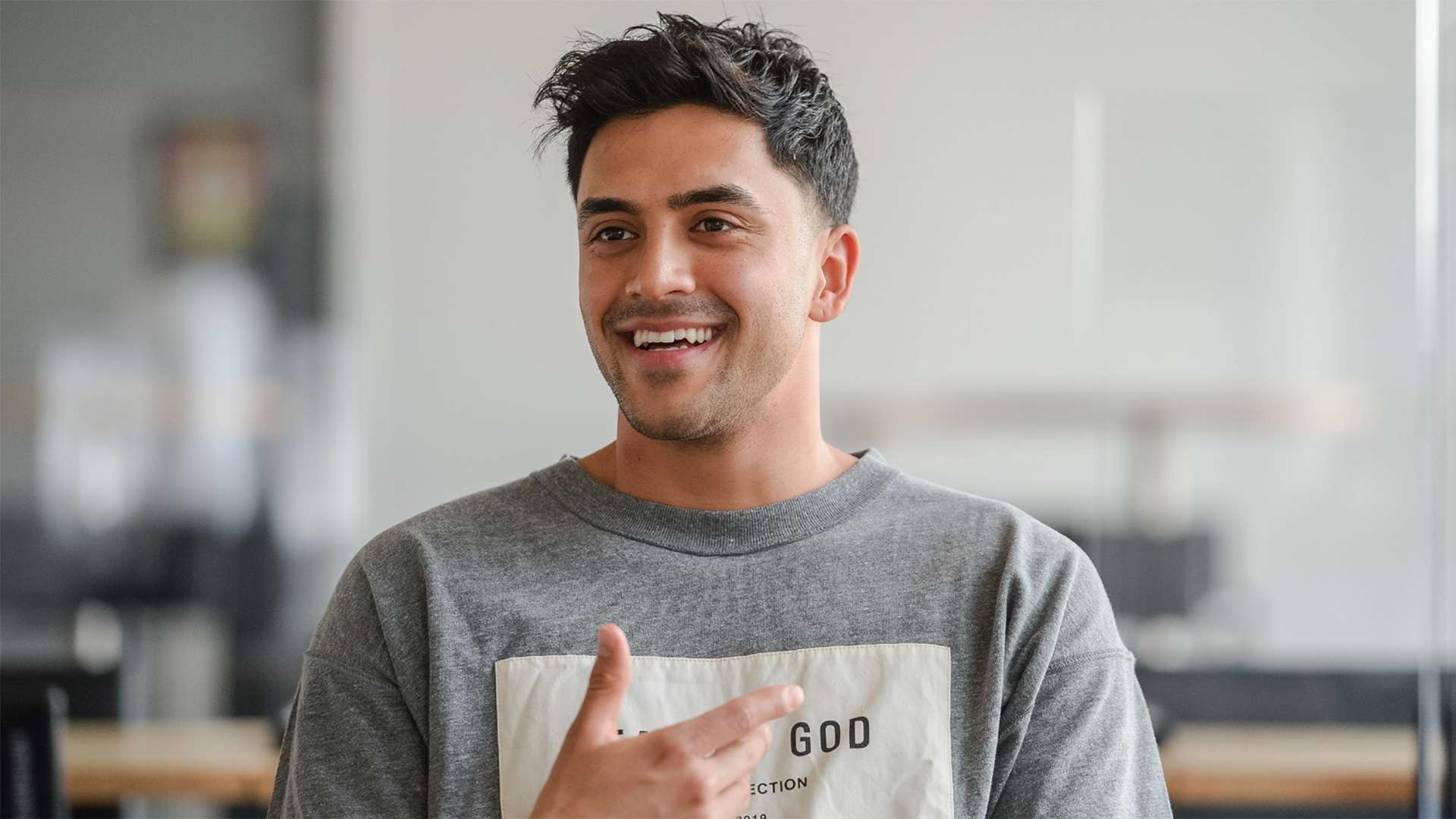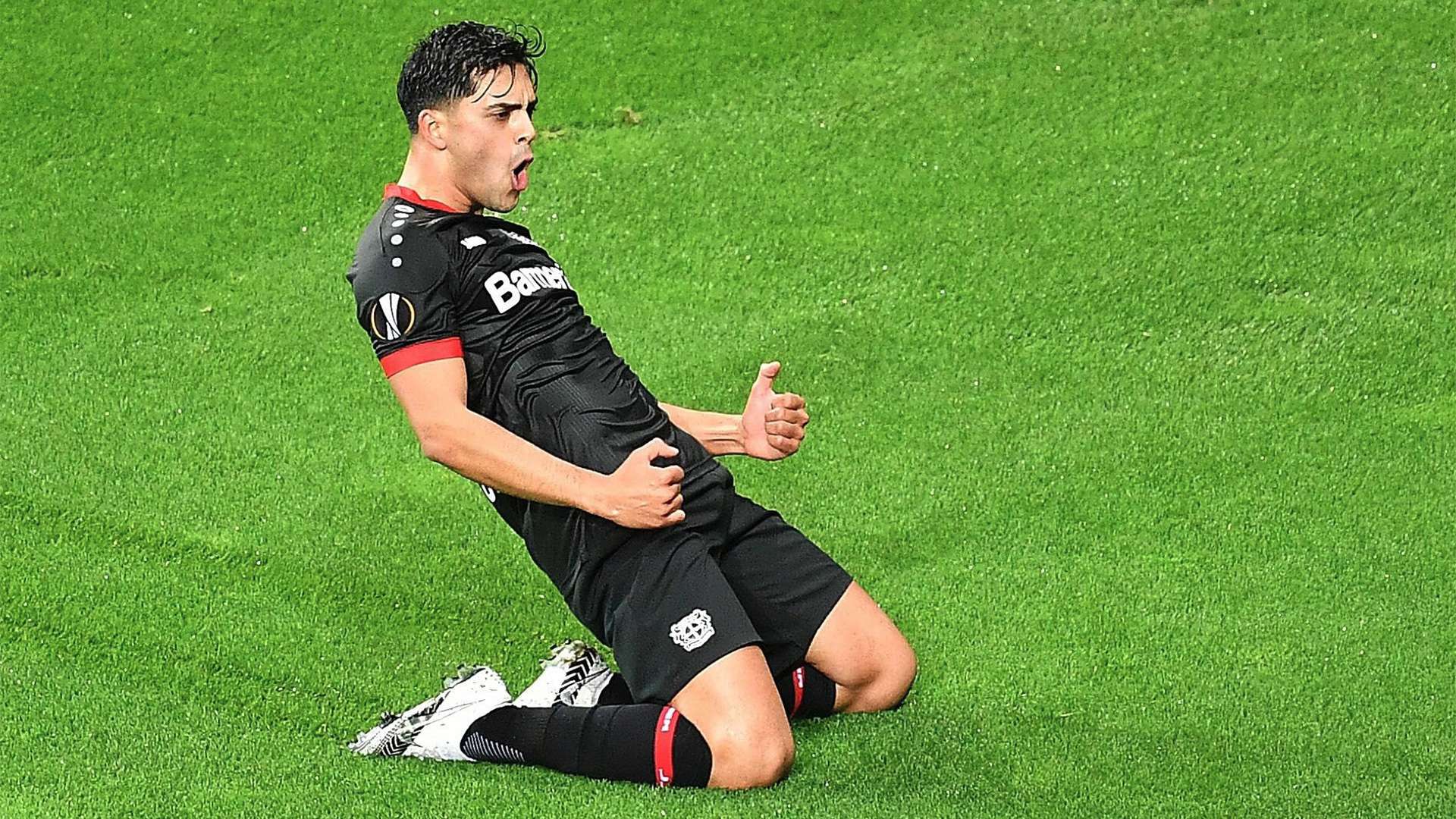'I learned everything in the cage'
Big interview with Nadiem Amiri

It's like a trip down memory lane for Nadiem Amiri. The recreation ground in Leverkusen-Rheindorf, where the midfielder met up with the Werks11 Magazine for a photo session, reminds him of his childhood. He gained his first experience of football in the dusty football courts in Ludwigshafen. It's the right place to talk to the 24-year-old Werkself midfielder about being a leader, winning mentality and values.
Nadiem, you once jokingly called yourself a mongrel. Somebody who took their first steps in football, on a recreation ground, in a cage like this. What's special about that?
Amiri: "I think players who grew up on a recreation ground have this winning gene, a total winner mentality. Because you just don't want to lose against your friends particularly when you're the better football player. I hate losing. I also learned how to come out on top against older lads and about never giving up. And my football technique comes from there too because it's simply more difficult than it is on a top-class pitch. That really shaped me. I'm very, very grateful for that time."
What was your childhood like?
Amiri: "It always started straight after school. I had four best friends who I was in class with from the first to the ninth year. We all come from Mundenheim (a neighbourhood in Ludwigshafen;ed.) and we always played football together. I always used to go home briefly after school, my mother cooked and then I said, 'Mum I have to get going quickly.'"
And then you went and played football.
Amiri: "My mother was always worried that something would happen to me and that's why she always drove me everywhere including to the recreation ground. Sometimes she'd go to pick me up from the same recreation ground in the evening but I was at another one. (He laughs) That's what my day looked like growing up. I always said to my mum that I didn't have any homework even though that was a lie most the time. I used to do the work the next day just before lessons. I definitely wasn't the best pupil in the school but on the other hand, thank God, I was always a smart lad and I knew what was important in life: respect. In a certain way the recreation ground taught me more than school. I learned everything in the cage."

How do you mean?
Amiri: “Of course, everybody knows school's important. And I wouldn't deny that. But I think your environment makes a stronger impression as you get into situations you don't expect. At school a teacher can say, 'Learn this and that,' but you learn everything in real life. Obviously it's also important to have a good, intact family. That influences education and your character. My life was definitely on the recreation ground playing football with friends, with lots of different people and cultures. Regardless of whether the lads were older, younger, fatter, thinner, bad or good: We all played together and nobody was shut out or the like. Everyone's equal.”
It was about mutual respect for you all.
Amiri: "Nobody was excluded on the recreation ground. We were always friendly. We always wanted lots of people there. The children came from all over the place. We never said: 'No, you can't play.' We made sure that everybody could play. That's how we were brought up. And if we didn't have enough to eat and drink then everything would be shared. And that makes my family and me strong up to this day. I think that's why I've been given everything I have from dear God."
Are you still in contact with the lads from back then??
Amiri: "Yes, with all of them. I've known Alexander Esswein since I was a little boy; Baris Atik there, the Bochum player Danny Blum is the best friend of my brother. And we used to play football indoors with Hakan Çalhanoğlu. So there are a few from our neighbourhood who have made it in professional football. Of course, there isn’t that much time to get together during the season. But, for example, we do have a kickabout on the hard rubber pitch when we can."
Away from the recreation ground, you started your club career with the local Ludwigshafen SC.
Amiri: "That's where I started and then I signed for FC Kaiserslautern and played there until I was 13. Then they threw me out. Too bad. I wasn't good enough they said. That was a stroke of luck for me. I almost have to be grateful to them.” (He laughs)."
You earned your first professional contract via Waldhof Mannheim and the youth set-up at TSG Hoffenheim. Can you remember that moment?
Amiri: "It was my 18th birthday on 27 October 2014. Monday, I know that exactly. I celebrated my birthday on Sunday night and all my friends knew that I would sign the contract on Monday. I was all done in but I've never drunk alcohol before in my life. I didn't get enough sleep and then I went to the TSG offices with my parents. I was knackered and euphoric at the same time."
It must have been very special for your parents.
Amiri: "My parents cried because they knew it had all been worth it. Even though I hadn't achieved anything yet, the first wages were obviously really low and the money disappeared in a flash. My parents and I knew: It was all down to me and I had to do my best. And the way it's turned out I’m as over the moon as my parents, of course."
Your parents had to flee to Germany from Afghanistan because of the fighting and start again here with nothing. Your discipline, your desire to get on have probably shaped you.
Amiri: "Absolutely. Back then, my father sold cars during the day and worked at Burger King as a cleaner in the evening when it was all closed up. My mother worked in an old people's home. My parents did everything for themselves although they couldn't speak the language when they came to Germany. They passed on that attitude to me: It doesn't matter what you have, it doesn't matter what you are: You are always the same human being, always worth a lot. And you have to battle for your targets. My parents always used to say to me: 'It doesn't matter what you want: You can achieve everything in this world but you really need to want it.' So don't just say, 'I want that' but instead do everything to achieve it. I'm grateful for every set back, every difficult moment: That all shaped me and made me stronger and stronger. I think I definitely emit the feeling that I want to achieve everything. Definitely."

Is it this role of emotional leader that you'd increasingly like to fill at the Werkself as well?
Amiri: "I don't do anything just to be cool or to put on a show. I am who I am and those are my emotions. And I think this season you can see that I feel really good here and have really settled in. Of course, I try to help the team with my mentality. I think this season I've grown a bit more into the role of leader. I feel that I can be one. That's not arrogance but rather self-confidence."
How would you describe your development here at Bayer 04?
Amiri: "I just needed the first year to get settled then. I was at Hoffenheim for seven years and away from home for the first time. I'm a family man and I need that contact. Particularly during the coronavirus pandemic it was even more difficult for me as I didn't have my family with me. A few bits of furniture were missing and the flat was almost empty and cold. Now my parents are regularly here, my girlfriend is often here with me in Düsseldorf as she studies online, and I've got to know the neighbours. I've settled in personally and with the club and I have earned a certain standing."
Do you feel growing recognition?
Amiri: "People come up to me and say that I have a leader gene in me and that I should lead the way. On the pitch I'm somebody who talks a lot because I want to help the team. But I'm not somebody who is particularly loud in the dressing room or on the training ground. If I want to sort something out with another player then I say it to him individually and not in front of the team. We should all be prepared to accept responsibility. And anybody who leads the group will do that automatically. That just develops. We have a lot of young players and it can take time before a hierarchy develops. That's the process we're involved in."
One of the scenes that is an example of your changed role in the team was winning the ball in the derby against FC Köln with a scoreline at 4-0 – and then the following outburst of emotion.
Amiri: "The whole move was me 100%. I tried to go forwards, lost the ball and then ended up chasing it. When I won the tackle it just burst out. And the whole team was shouting on the pitch and everybody celebrated. It was briefly loud in the stadium although there were no spectators. Then I noticed: 'Yes, that's us.' I think that scene reflected our whole performance in the first half of the season. The energy was there to give our all at every moment. I think we were all brilliant in the first half of the season."

The second half of the season hasn't been so successful unfortunately.
Amiri: "We've had a week phase as a whole team. With me, at the same time as the coronavirus infection, came the dip in form that can happen to anybody in a season. I played a lot of games and felt a bit drained. Then I dropped off which is only human."
How did the coronavirus infection affect you?
Amiri: "I had three or four days with a lot of pain in my limbs plus headaches. I was extremely knackered and had problems breathing deeply. And then when I started the Europa League game against (Young Boys) Bern nothing really worked in that half. I had such pain in my lungs that I had to ease off."
But now you're on the up again physically?
Amiri: "Yes, I feel better now. I'm not interested in what the newspapers say or how they assess me. It's all the same to me. On the other hand, if the coach comes to me and says, 'You've had a good game', then that's enough for me. I've been around a long time so I know whether I've played well or badly. The physical stats show I'm fully fit again. Now I'm getting stuck in again and want to play my part in the team."
Which former or current teammates have helped developed your mentality?
Amiri: "The Benders definitely. If I look at Lars and Sven and I can say: You couldn't be more of a leader. They show it outwardly and inwardly. The way they deal with players, with the whole team, get loud at times, speak with a clear mind. For me they are absolutely key players: the best I've ever seen in my career."
Was their being sidelined through injury perhaps one of the reasons why you've recently had a weaker phase?
Amiri: "Of course, we feel it very much when they're missing – and you can see that in the games as well. When the two of them are on the pitch as key players than that gives us a completely different appearance. Obviously we are hoping that they'll be back for the season run-in an able to help us. We want to give them a really great send-off."
The interview with Nadiem Amiri is taken from the Werks11 Magazine number 30. Bayer 04 Club members always receive the latest addition first. Click HERE for the previous editions.
